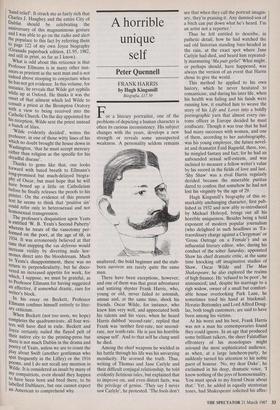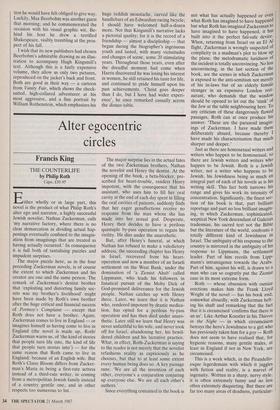A horrible unique self
Peter Quennell
FRANK HARRIS by Hugh Kingsmill Biografia, £17.50 For a literary portraitist, one of the problems of depicting a human character is often its curious inconsistency. His subject changes with the years, develops a new strength or reveals some unsuspected weakness. A personality seldom remains unaltered; the bold beginner and the stub- born survivor are rarely quite the same man.
There have been exceptions, however; and one of them was that great adventurer and untiring shyster Frank Harris, who, young or old, never failed to astonish, amuse and, at the same time, shock his friends. Oscar Wilde, for instance, who knew him very well, and appreciated both his talents and his vices, when he heard Harris dubbed `second-rate', replied that Frank was 'neither first-rate, nor second- rate, nor tenth-rate. He is just his horrible unique self . And to that self he clung until he died.
Among the chief weapons he wielded in his battle through his life was his unvarying mendacity. He scorned the truth. Thus, writing of Thomas and Jane Carlyle and their difficult conjugal relationship, he told evidently fictitious tales, but explained that to improve on, and even distort facts, was the privilege of genius. 'They say I never saw Carlyle', he protested. 'The fools don't see that when they call the portrait imagin- ary, they're praising it. Any damned son of a bitch can put down what he's heard. I'm an artist not a reporter.'
Thus he felt entitled to describe, in pathetic detail, how he had watched the sad old historian standing bare-headed in the rain, at the exact spot where Jane Carlyle had died, and heard him repeated- ly murmuring 'Ma puir girlie!' What might, or perhaps should, have happened, was always the version of an event that Harris chose to give the world.
This method he applied to his own history, which he never hesitated to romanticise, and during his later life, when his health was failing and his funds were running low, it enabled him to weave the story of his Life and Loves into a boldly pornographic yarn that almost every cus- toms officer in Europe decided he must confiscate. Though it was true that he had had many successes with women, and one of them, according to her autobiography, was his young employee, the future novel- ist and dramatist Enid Bagnold, there, too, he mingled fantasy and fact; for he had an unbounded sexual self-esteem, and was inclined to measure a fellow writer's value by his record in the fields of love and lust. `Shy Shaw' was a rival Harris regularly derided because the miserable puritan dared to confess that somehow he had not lost his virginity by the age of 29.
Hugh Kingsmill's biography of this re- markably unchanging character, first pub- lished in 1932 and now ably re-introduced by Michael Holroyd, brings out all his horrible uniqueness. Besides being a bold exponent of modern popular journalism (who delighted in such headlines as 'Ex- traordinary charge against a Clergyman' or `Gross Outrage on a Female') and an influential literary editor, who, during his conduct of the sober Saturday, appointed Shaw his chief dramatic critic, at the same time knocking off imaginative studies of Shaw, Oscar Wilde and The Man Shakespeare, he also explored the realms of high finance. He 'refused to be poor', he announced; and, despite his marriage to a righ widow, owner of a small but comfort- able house overlooking Park Lane, he sometimes tried his hand at blackmail. Horatio Bottomley and Lord Alfred Doug- las, both tough customers, are said to have been among his victims. At his worst and his best, Frank Harris was not a man his contemporaries found they could ignore. In an age that produced some brilliant talkers, the sheer Falstaffian effrontery of his monologues might astound the most sophisticated audience, as when, at a large luncheon-party, he suddenly turned his attention to his noble guest of honour. 'No, my dear Duke', he exclaimed in his deep, dramatic voice, 'I know nothing of the joys of homosexuality. You must speak to my friend Oscar about that.' Yet, he added in equally stentorian tones, had Shakespeare solicited his affec- tion he would have felt obliged to give way. Luckily, Max Beerbohm was another guest that morning; and he commemorated the occasion with his visual graphic wit. Be- hind his host he drew a terrified Shakespeare, visibly trembling at the pros- pect of his fall.
I wish that its new publishers had chosen Beerbohm's admirable drawing as an illus- tration to accompany Hugh Kingsmill's text. Although this is a fairly expensive volume, they allow us only two pictures, reproduced on the jacket's back and front. Both are good in their way — a cartoon from Vanity Fair, which shows the check- suited, high-collared adventurer at his most aggressive, and a fine portrait by William Rothenstein, which emphasises his huge reddish moustache, curved like the handlebars of an Edwardian racing bicycle; I should have welcomed half-a-dozen more. Not that Kingsmill's narrative lacks a pictorial quality; for it is the record of a friendship — almost a discipleship — that began during the biographer's ingenuous youth and lasted, with many vicissitudes and changes of scene, some 20 stimulating years. Throughout those years, even after the dreadful moment had come when Harris discovered he was losing his interest in women, he still retained his taste for life, and continued to pride himself upon his past achievements. 'Christ goes deeper than I do, but I have had wider experi- ence', he once remarked casually across the dinner-table.



















































 Previous page
Previous page